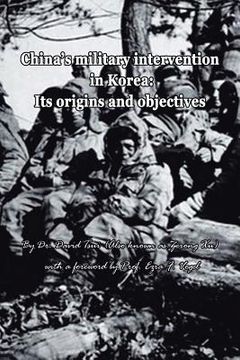Compartir
China's Military Intervention in Korea: Its Origins and Objectives (en Inglés)
David Tsui Also Known as Yerong Xu
(Autor)
·
Trafford Publishing
· Tapa Blanda
China's Military Intervention in Korea: Its Origins and Objectives (en Inglés) - Tsui Also Known as Yerong Xu, David
$ 57.882
$ 72.353
Ahorras: $ 14.471
Elige la lista en la que quieres agregar tu producto o crea una nueva lista
✓ Producto agregado correctamente a la lista de deseos.
Ir a Mis Listas
Origen: Estados Unidos
(Costos de importación incluídos en el precio)
Se enviará desde nuestra bodega entre el
Viernes 02 de Agosto y el
Martes 13 de Agosto.
Lo recibirás en cualquier lugar de Argentina entre 1 y 3 días hábiles luego del envío.
Reseña del libro "China's Military Intervention in Korea: Its Origins and Objectives (en Inglés)"
This study examines how and why China's military intervention in the Korean War came into existence within the time span from May 1949 to July 1951. China was involved in the war preparations much earlier and deeper than was previously known. Beijing's preconditions to enter the war boiled down to three: (1) its full control of China; (2) foreign enemy forces' invasion of North Korea; and (3) Moscow's logistic and air support. Beijing had incorrectly calculated that Washington would dispatch only Japanese field forces to Korea, which is the very reason underlying its inadequate though early preparations for the war, while it had correctly calculated that Washington would not invade China proper via Korea before it entered the war. Expecting an enemy troops' landing at Inchon followed by their invasion of North Korea, Beijing planned to ambush them in northern North Korea. It therefore failed to dispatch a symbolic force into Korea to give credibility to diplomatic deterrence against Washington's possible invasion of North Korea. China developed ten prime interventionist goals as follows: (1) to save North Korea; (2) to dispel Stalin's suspicions and to pay Mao's political debt owed to Stalin in 1941 and 1942; (3) to have the PLA experienced in modern warfare; (4) to have the PLA modernized with Soviet weaponry; (5) to have its economy revitalized with overall Soviet assistance; (6) to enter the United Nations; (7) to exchange South Korean territories for an American withdrawal from Taiwan; (8) to have Nationalist forces in Taiwan; (9) to defuse an American retaliatory or nuclear attach upon China proper; and (10) to have North Korea and South Korea almost return to the status quo ante bellum. It was Mao's de facto dependence upon rather than his alleged independence from Stalin that had made him rise to power in 1949. This Soviet reign turned out to be considerably more decisive than the American threat in driving China into the war in 1950.
- 0% (0)
- 0% (0)
- 0% (0)
- 0% (0)
- 0% (0)
Todos los libros de nuestro catálogo son Originales.
El libro está escrito en Inglés.
La encuadernación de esta edición es Tapa Blanda.
✓ Producto agregado correctamente al carro, Ir a Pagar.

